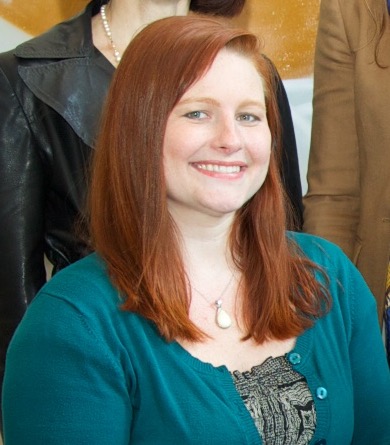
Please introduce yourself (name, year, concentration, activities you participated in at Heller, what you are doing now):
I graduate from the Heller MPP program in 2012 with a concentration in poverty alleviation. I am currently job searching and doing some temporary and contract work with Boston area nonprofits. I live in Wollaston, MA, blog at becomingworldly.wordpress.com, and have lately been finding myself more interested in policies and policy implementation that are trauma-informed and actively fostering post-traumatic resilience.
What were you doing before you came to Heller?
I was working in development at a small substance abuse treatment clinic in Slidell, LA, where I started as an AmeriCorps VISTA member. This was after hurricane Katrina and during the BP oil spill, so substance abuse was increasing, alongside state funding cuts.
Why did you decide to come to Heller?
I wanted to learn how to help solve poverty related problems at a systemic level, connect the dots, and contribute more effectively.
What are some of the classes/activities that really enjoyed at Heller?
I was lucky to take a class with Dr. David Gil before he retired. His framework on unmet human need really blew my mind and I still find myself thinking about it. I also loved learning about GIS mapping (it is a great tool for decision-making) and how to ask research questions of people and data sets in a responsible manner, as well as evaluating policy and presenting recommendations to an audience. I also really enjoyed just hanging out in the Zinner forum. I had some of the most interesting and informative conversations with fellow students from all over the world.
Can you say a little about where you were and what you did for your summer internship?
I didn’t do a summer internship. I was the only one in my class who didn’t, actually. Instead I went to therapy. Growing up poor myself, having this field be incredibly personal for me, it was actually quite hard to learn about the social determinants of poverty the way Heller taught it. Being given the framework to connect the dots and see where my own experiences fit into that, and that the story was different than I’d thought going into the program, was rather devastating at the time. I also simultaneously realized that far too many anti-poverty initiatives don’t connect these dots and are falsely premised on simply helping poor people overcome the error of their ways. Looking at these issues from a systemic level rather than individually, you realize that our society doesn’t have a “poor people problem” but rather a wealth hoarding problem, and blaming poor people or their cultures or neighborhoods as being the source of the problem is a very harmful and pervasive form of victim blaming. It was eye opening and altered my worldview in a way that was overwhelming at the time. Poor people’s cultures are a mix of resourcefulness combined with trauma and exhaustion, the only things they are lacking are resources and support. Teaching people how not to be poor is not a real solution, but actual investment and empowerment is hard to come by, but exactly what we need.
How do you use the skills you learned at Heller in your profession?
I used my capstone project, which was entitled “The Wild West of Homeschooling: Bringing Adequate Oversight to Parent-Educated Children and Youth” to build a homeschool reform advocacy organization, The Coalition for Responsible Home Education (CRHE), with an accompanying policy platform. I’m no longer there, but it still exists. In January of 2014, after I’d moved on, they were quoted on the front page of the New York Times. ProPublica also did a big piece on the issue, using our research on state level data (https://projects.propublica.org/graphics/homeschool). That was pretty cool. I built the first layers of a much-needed policy thing that had never existed before. Then I served as an Innovation Fellow at the MA Commonwealth Office of the Government Innovation Officer’s Office. It was disbanded once the new governor took office, but I got to work on a $5 million bond bill grant pilot project for school wifi with three government agencies, and help put on a civic innovation tech event with Google. I’m not sure what I’ll be doing next, as I’m feeling pretty picky. I expect whatever I put my time and energy into to be built for impact and have a solid theory of change and implementation plan.
I went to Heller to learn how to build and reform systems so that they can help people who grew up like me. People who have a lot to offer but a lot of struggles and obstacles standing in the way. That’s still my goal. And I think I’m a lot better prepared for making a meaningful difference because of Heller.

One thought on “Alumni Spotlight: Heather Doney”